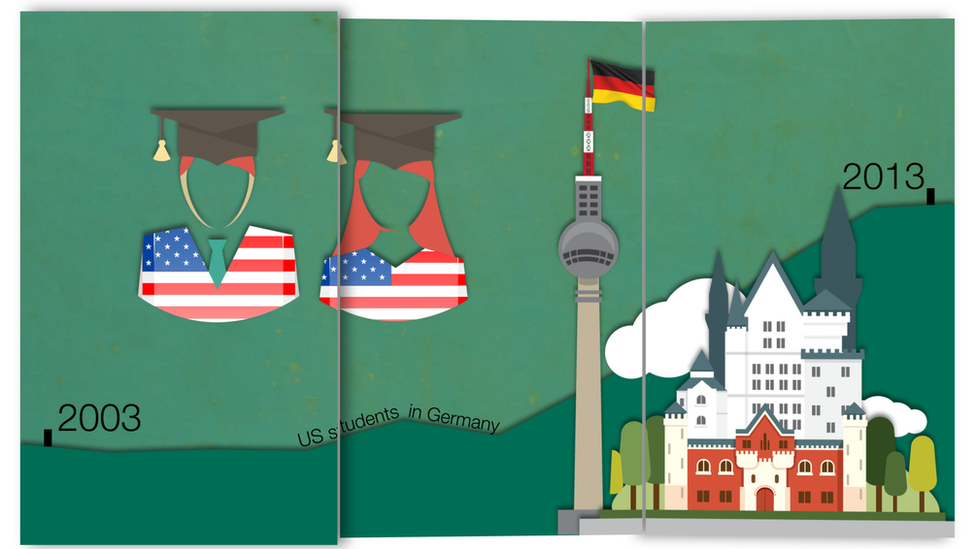How Germany abolished tuition fees
- Published

Students at this Berlin university will not have to pay tuition fees
More than a million young people will be enrolling in universities in England and Germany this autumn.
But in financial terms their experience couldn't be more different.
In Germany tuition fees have been abolished, while England has the most expensive fees in Europe, with every indication that they are likely to be allowed to nudge even higher.
But what difference does it make to their universities?
The Higher Education Policy Institute's director, Nick Hillman, has published an analysis - "Keeping up with the Germans?", external - which looks at the impact of these contrasting funding systems.
The biggest difference is that a much smaller proportion of young people go to university in Germany.
In Germany, about 27% of young people gain higher education qualifications. In the UK, the comparable figure is 48%. The expansion in university entry in the UK has been one of those changes that has been so big that no one really notices.
Degrees of 'free'
But it would be wrong to think that the absence of fees means that the German system is starved of funding.
Germany spends a slightly higher proportion of GDP on higher education, there are more academic staff in German universities and Germany is significantly ahead in spending on research and development, both from public and private sources, investing 3% of GDP compared with 1.7% in the UK.

While tuition fees were acrimoniously increased in England, they were scrapped in Germany
Students muttering about what had happened to their £9,000 might be relieved that spending per student is about 20% higher in the UK than in Germany.
In terms of quality, there are more UK universities at the top end of international league tables. But this is because league tables do not always include research institutes which do not teach or award degrees - and Germany has a much more distinct separation between teaching and research universities.
Report author Mr Hillman says that if the elite German science institute, the Max Planck Society, were included in global rankings it would overtake both Oxford and Cambridge.
The biggest difference seems to be not the outcome but the political decision about who pays. In Germany it's the taxpayer, in England the individual student gets the bill.
And that poses different types of question for what happens next.
Can the German university system afford to expand and produce more graduates under the current taxpayer-funded "free" model?
Value for money?
For the English system, the questions are for the students who have to pay. How much is too much? Even with a system of loans and deferred repayment, when do the costs outweigh the benefits?

Figures published this week showed that more than half of young women now enter higher education
Questions about value for money - and warnings about debts - have been recurrent since fees were introduced in the 1990s. They've risen in volume as fees have risen rapidly from about £1,000 to £3,000 and then £9,000.
While tuition fees have stolen the headlines, the biggest financial challenge for families might often be the low level of maintenance loans for living costs.
Adding to these money worries are stories about graduates who cannot get graduate jobs or who are unemployed.
A report from the Chartered Institute of Personnel and Development last month claimed that more than half of graduates were overqualified for their jobs. In contrast, the institute said that only 10% of German graduates were in non-graduate jobs.
But such anxieties about the cost of going to university tend to overlook the the cost of not going to university or getting high-level vocational skills.
Figures last week from the Higher Education Statistics Agency showed unemployment for graduates had fallen back to pre-recession levels, with 2.6% of graduates unemployed. Rising numbers of graduates did not mean more graduates without jobs.
There is no breakdown of graduate and non-graduate jobs, but 86% of graduates were satisfied with their careers.
The international evidence from organisations such as the OECD has remained steadfastly in favour of the financial benefits of higher education.
The economic think tank has argued that an increasing proportion of jobs will require high levels of skills and qualifications - and it rejects the idea that there is an over-production of graduates.
'Precariat'
The OECD has warned that the biggest risk is not to disgruntled graduates, but to young people with few qualifications competing for an evaporating pool of unskilled work.
In the US, the Pew research group highlighted that while graduates might have had a tougher time during the recession, the real losers were those with few qualifications.
The so-called "precariat" - those trapped in low-skilled, low-pay, insecure jobs - might not get the same attention as under-employed graduates, but they are the other side of this polarisation of the workforce.
While such economic viewpoints tend to take an overview of the labour market, for individuals it's about personal ambitions and family aspiration, rather than percentages.
And in the UK there has been a seemingly irresistible rise in demand for university.
Despite the surge in tuition fees in England, this week's figures on higher education participation show no sign of a reduction in demand.
These latest figures show 47% of people entering higher education in England, up from 43% the year before. Among young women, the proportion is 51%. It's now an expectation for a majority of young women.
Don't expect the arguments about value for money to go away, but don't expect any fall in demand for places.
- Published3 June 2015
